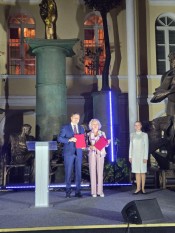
Presidential Library and Moscow State Institute of Culture agreed on cooperation
On October 17, 2024, as part of the international congress Universities of Culture and Arts in International Humanitarian Cooperation: Dialogue of Cultures between Russia and China, a cooperation agreement was signed between the Presidential Library of the Administrattive Directorate of the President of the Russian Federation and the Moscow State Institute of Culture. This agreement was signed by Yuri Nosov, the Director General of the Library, and Ekaterina Kudrina, the rector of the Institute.
The main goal of this agreement is to promote cooperation in the development of Russian and world culture, science, and education. It also aims to preserve and popularize the historical and cultural heritage of Russia. Special attention will be given to spiritual, moral, civic, and patriotic education. The agreement also includes the implementation of various scientific, educational, cultural, and research programs and projects.
The Presidential Library and the Moscow State Institute of Culture have decided to hold joint events, such as conferences, round tables, seminars, forums, exhibitions, master classes, and scientific competitions.
Worths noting that the Presidential Library's collection includes more than one million digitized documents and archival materials. These include scientific and educational films, as well as abstracts from dissertations on the history of Russian statehood and the Russian language.
Some of these materials can be found on the library's portal, while others are available in electronic reading rooms in St. Petersburg, Moscow, the Tyumen region, and other locations in Russia and abroad.
The library also runs numerous cultural and educational programs, such as virtual tours, exhibitions, lectures by renowned scholars, master classes, and competitions. These initiatives aim to make learning more engaging.
The Presidential Library is located in the heart of St. Petersburg, in a historic building that was built in the second quarter of the 19th century by the renowned architect Karl Rossi. This building now serves as a national digital archive, housing important documents related to the history of the Russian state. It also functions as a multifaceted cultural, educational, and scientific center, providing information and analysis for a wide range of audiences.





